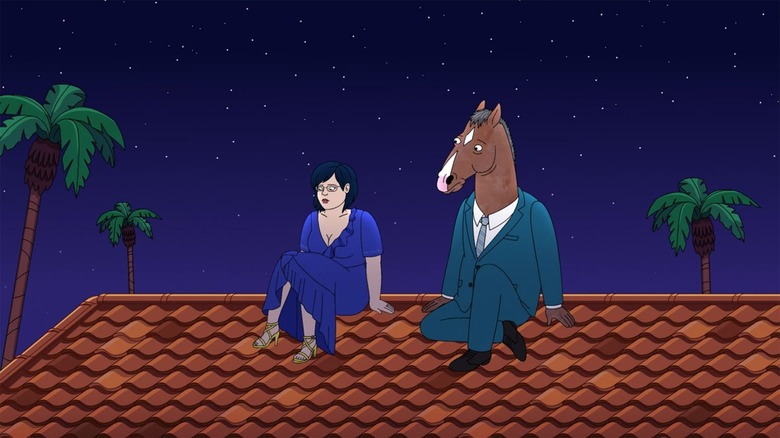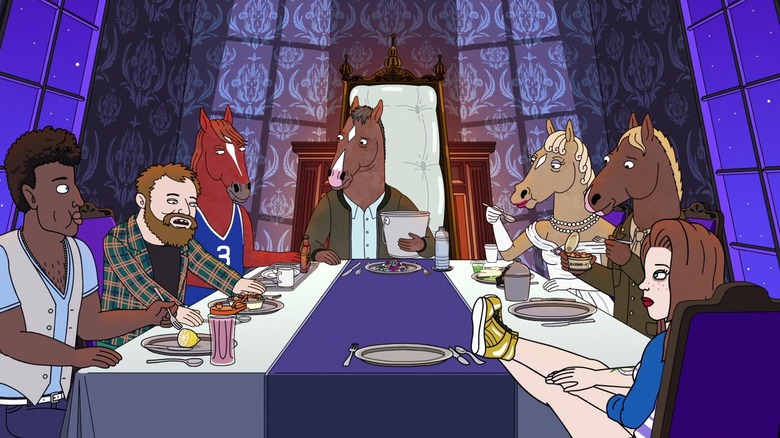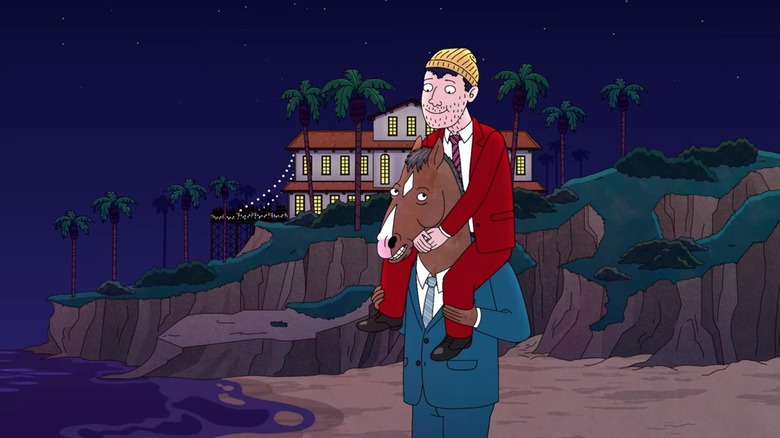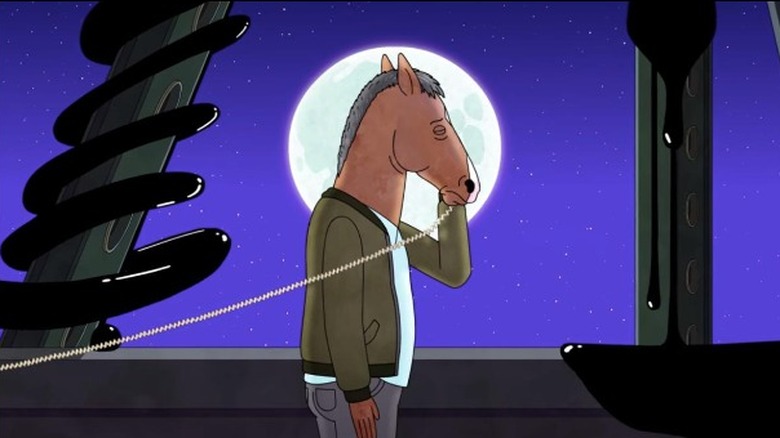Bojack Horseman Ending Explained: Yeah, It Was Nice While It Lasted
They say time heals all wounds, But evidently, two years hasn't been long enough to soothe the sting of the "Bojack Horseman" season finale, arriving as a two-part gut punch that began with the surreal "The View from Halfway Down" and ending with the emotional K.O. of "Nice While It Lasted." But the show's ending offers not much in the way of closure regarding its eponymous horse. Instead, Bojack (Will Arnett) is put through the wringer one final time and nearly dies because of it. Meanwhile, the mildly happy endings that unfold in the final episode amongst his remaining friends, culminating in the marriage of Princess Caroline, only add to the final episode's bittersweetness as everyone prepares to go their separate ways.
But whether it's beating addiction or trying to put behind you the constantly reverberating consequences of your most horrible of mistakes, "Bojack Horseman” makes it clear that permanent happy endings don't exist. One need only look to the six seasons its main character has spent crawling tooth-and-nail towards being a better horse, only to backslide dramatically due to substance abuse and unresolved trauma. The lucid message of the show is that self-improvement is a never-ending chore, and that doesn't just stop at the end of 30 minutes. You don't just wake up one day a better person morally or psychologically — you have to keep doing the hard work every day. But despite the melancholy, the series finale was not without reasons to hope.
Bojack reckons with his past
"The View from Halfway Down" is a fitting metaphor for "Bojack Horseman," disguising a dark truth behind what begins as a kooky dream sequence populated by an ensemble cast. And although the big reveal at the end is that Bojack is drowning and is in the process of dying, the episode focuses on the ghosts he conjures to accompany him in his final moments. True to the episode's surreality, several of the imagined characters also display symbolic abnormalities.
Beatrice is as critical of Bojack as ever, but appears as a child, a reminder of the trauma that molded her. An adolescent Sarah Lynn meanwhile ages throughout the episode, a visual reminder of how she rapidly aged to the audiences of "Horsin' Around" and "Bojack Horseman." Then there's Bojack's father, who appears in the body of childhood hero Secretariat — the conflation of two deeply flawed figures highlighting the void of role models in Bojack's life. "You cared about getting drunk and telling everyone how miserable you were," he tells them scornfully, underscoring just how much he's become the very person he's blaming. It's a complicated group that Bojack lacks closure with, be it retribution or forgiveness.
Each of the characters serves as Bojack's attempt to unconsciously reconcile his expiring mortality. Making the untimely deaths of Sarah Lynn (which Bojack incited), Secretariat (who committed suicide), and even Corduroy Jackson-Jackson (auto-erotic asphyxiation) weigh heavily as each disappears. There's a frantic attempt by each to discern meaning, purpose, and understanding in their lives. It's a struggle that mirrors a lot of Bojack's own melancholic existentialism and that of his father/Secretariat. With the latter's poem becoming an eviscerating reminder that things may already be too late, having made the same mistakes as his idols, he's now doomed to repeat their fatal choices.
Bojack learns the true meaning of the hokey pokey
"The View from Halfway Down" saw Bojack face his inner demons, and in "Nice While It Lasted," he faces a group infinitely more daunting: the living. We join him in sifting through the rubble of friendships to assess the damage and discern if there's a place for him in their lives. As the wedding ceremony progresses, it becomes increasingly clear that the people around Bojack are learning to let him go. Fulfilled and no longer vulnerable to a toxic need to help coddle him, even Princess Caroline tacitly turns down the possibility of her ever being his agent again.
Of course, the real reckoning comes with Diane when she confronts him over the voicemail Bojack left her before nearly drowning, effectively telling him his inability to take responsibility for his actions leaves an impossible weight on the shoulders of the people around him. But rather than let it continue crushing her, Diane tells him she has moved on — marrying Guy and finally trusting herself — when she refers to Bojack in the past tense.
The loneliness that surrounds Bojack is depressingly tangible. But some comforting constants remain, like Mr. Peanutbutter, a presence the horse would've detested in season one but now seems to value. Then there's Todd Chavez, who offers a close-reading of the hokey pokey when Bojack starts to worry about screwing up his sobriety: "It's like the song says, 'You do the hokey-pokey and you turn yourself around.' You turn yourself around, that's what it's all about." Relapses happen – all that truly matters is that you've the courage to take responsibility for your actions and turn yourself around. Without the crux of people like Princess Caroline or Diane, not to mention his own apathy towards himself, Bojack finally has the chance to truly better himself.
Bojack gets a shot at recovery through accountability
The list of Bojack's terrible deeds is a depressingly long one, especially in regard to those he professes to be closest to. But by the show's final season, he's begun those baby steps towards making amends and moving on, starting with rehab. But his involvement with Sarah Lynn's overdose goes public, casting a light on the destructive control he exerts on the women in his life — although it's important to remember his choking of Gina remains hidden and unanswered. But the scandal is enough to finally completely estrange Hollyhock, losing Bojack one of the remaining women in his life, sending him on his near-fatal bender.
One of the reasons Bojack doesn't die — no matter how depressingly fitting it would've been — is that it'd be contrary to the show's squint-to-see-it optimism. As Diane tells him in the finale: "Sometimes life's a b**** and then you keep living." Dying would just be an easy cop-out after the many mistakes and wrongdoings Bojack must find a way to live with. Instead, he survives and serves prison time, one of the first times in six seasons he's ever been hit with real-world consequences. But like rehab, Bojack tries to make the best of it and doesn't try to run away as his old self might've. By living and actually facing the repercussions of his actions, the finale offers some hope that Bojack is done making excuses and is willing to do what he needs to truly change.



